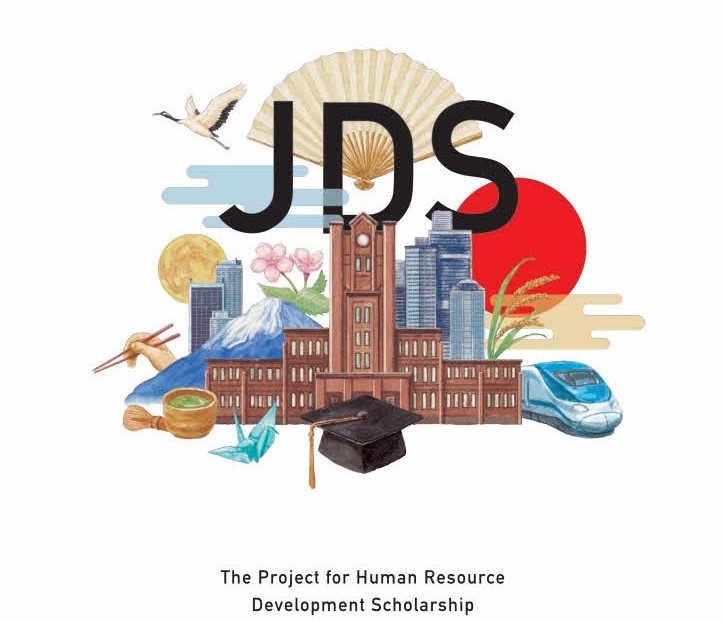1. Program Overview
The Project for Human Resource Development Scholarship (JDS) supports human resource development by providing young leaders from target countries with full scholarships for graduate degrees in top Japanese Universities.
JDS fellows are expected to contribute to the socio-economic development of their country, by actively engaging in policy formulation and implementation of social and economic development policies when they complete the program and return to their home country.
Through the JDS program, young leaders are also able to understand the Japanese society, learn about common interests and work towards common goals. The JDS program creates a system where academic exchanges, which include immersion and exposure to various fields, become a tool for strengthening international relations.

-
Operating Guidelines of the Project for Human Resource Development Scholarship by Japanese Grant Aid (JDS)
-
Lignes directrices opérationnelles du Projet de Bourses pour le Développement des Ressources Humaines dans le cadre de l'aide publique du Japon(JDS)
-
Directrices de Operación del Proyecto de Becas para el Desarrollo de Recursos Humanos financiado por la Donación Japonesa (JDS)
2. Target Countries and number of accepted students
The JDS program, which started in 1999, initially targeted Asian countries transitioning into a market economy. However, target countries gradually increased to cover other countries with strong bilateral relations with Japan, who requested for support in human resource development. The JDS has been implemented in 23 partner countries and in 2024 the program started accepting Ukraine.
In 2024, 315 JDS fellows from 20 countries were accepted, and the total number of JDS fellows who have come to Japan so far is 6,345 for master's and doctoral programs.
3. Procedure
The JDS program is under the Grant Aid scheme that works under a government-to-government framework. Under this scheme, the target country's government, together with representatives from the Japanese government and JICA conducts a preparatory survey to determine the (1) implementation policy, (2) program schedule, (3) priority fields of study, (4) accepting universities in Japan, (5) selection process and (6) appropriate number of JDS fellows. During this preparatory survey, the program design is formulated in line with the target countries' priority development issues and Japan's country strategy.
4. Accepting Universities and Disciplines
This Program works with Japanese universities that offer Master’s and PhD courses in English to provide opportunities for international students. Master’s courses of universities are selected through consultations with the steering committee of each country based on the proposals submitted by universities in response to annual calls for proposals for this Program.
In FY2016, JICA started calling for applications for PhD study from JDS Master’s alumni, first from five countries, including Laos and Myanmar, and now from other countries as it is expanding the Program.
The Program mainly focuses on social science fields, such as public administration, public policy analysis, economics, and law, selected by the steering committee of each country based on relevance to their priority development sectors and issues. Based on the Japan’s Country Assistance Policies and survey results, each country’s priority development sectors and issues (sub-programs/components) are determined, and country-specific four-year plans are developed including research fields and universities covered by this Program.
5. References
Japan International Cooperation Center (JICE) (external link)
Japan Development Service (JDS) (external link)




scroll